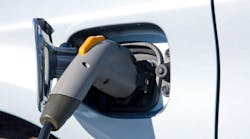The New York City Dept. of Sanitation has launched a pilot project to demonstrate the performance of diesel emissions control technology on sanitation vehicles. Engine maker Cummins Inc. and the Northeast States for Coordinated Air Use Management (NESCAUM) are also participating in the project.
Although the pollution control equipment is not required, the Sanitation department said it is demonstrating “national leadership” by working voluntarily to reduce particulate emissions by up to 90% on a portion of the city's sanitation fleet.
Over the next three years, the department plans to retrofit about 260 sanitation trucks with diesel particulate filters; it has already acquired four CNG street sweepers with the financial assistance of the other project participants.
“In deploying these vehicles, we have reached a milestone of the project: the department is currently pilot testing four refuse collection trucks in order to determine the direction the project takes over the next several years,” said Jerry Della Corte, deputy commissioner of support operations for the department. “This will provide a template for early reduction of sanitation vehicle emissions across the country.”
This project is one of only a few such retrofit programs in the country. While diesel particulate filters are commercially viable for higher exhaust temperature applications, such as urban buses, the technology is still evolving for low-exhaust-temperature applications such as sanitation vehicles.
In the colder Northeast climate, sanitation trucks normally do not exhibit exhaust temperatures conducive to passive filter regeneration. Without regeneration, particles continuously accumulate on the filter, which can lead to an increase in backpressure, potentially affecting the engine and its performance.
“Because these filters are so efficient in removing particles from diesel exhaust, regeneration has become critical to their implementation in this project,” explained Christine Vujovich, vp of environmental policy at Cummins. “Our goal is to maximize the filter's ability to regenerate while minimizing the risks involved in using the technology.”
The Dept. of Sanitation will provide ultra-low-sulfur-diesel fuel, a pilot project requirement. Sulfur in standard highway diesel fuel reduces diesel particulate filter efficiency and increases filter regeneration temperature, thus making the technology less feasible on sanitation trucks. However, the lower levels of sulfur in diesel fuel have virtually no effect on the filter catalyst.
Although EPA does not require the commercial availability of ultra-low-sulfur diesel until 2006, Sprague Energy, the project's fuel supplier, has accelerated availability of ultra-low-sulfur diesel in the Northeast due to interest in particulate filter technology.
The first four trucks in the pilot test will be carefully monitored over the winter. The program is testing two alternative filter technologies manufactured by Johnson Matthey and Engelhard Corp.
Fleetguard Nelson, a division of Cummins, designed and manufactured the exhaust hardware. Non-profit NESCAUM is coordinating the project.


